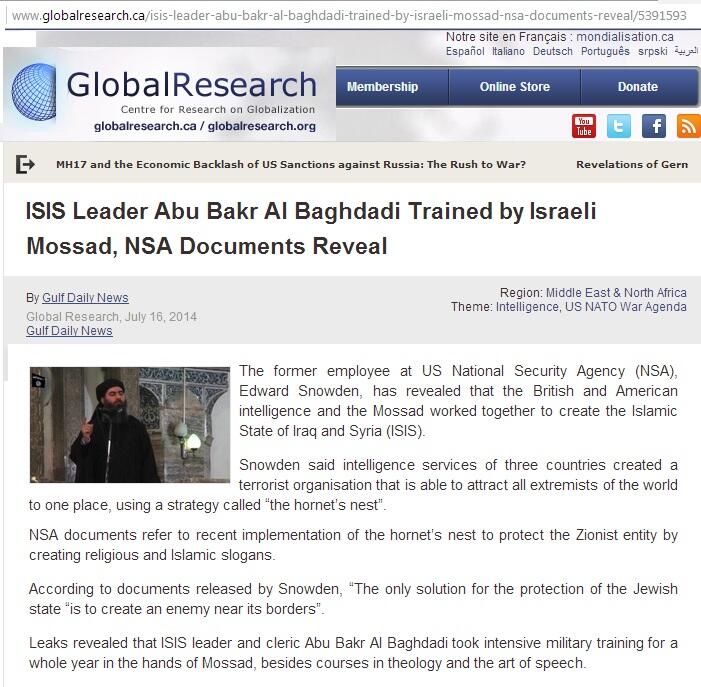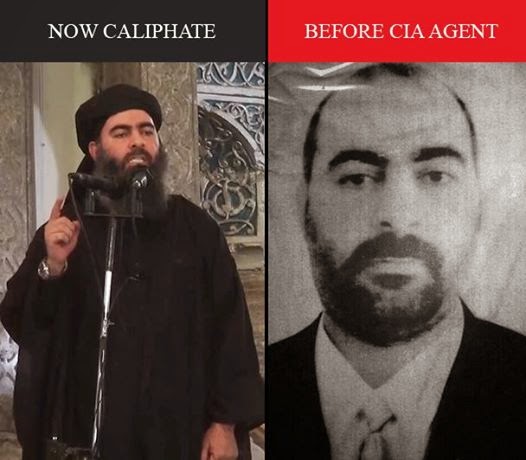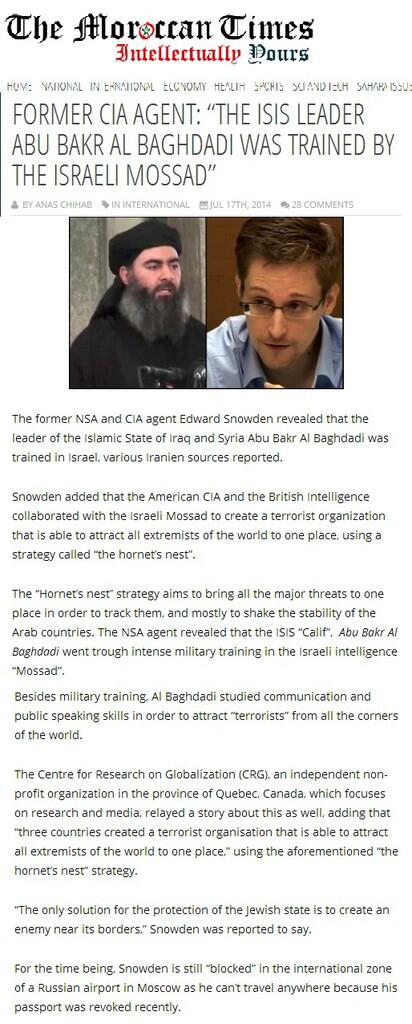- Beranda
- Komunitas
- News
- Berita dan Politik
ISIS Leader Abu Bakr Al Baghdadi Trained by Israeli Mossad, NSA Documents Reveal
TS
centilluque
ISIS Leader Abu Bakr Al Baghdadi Trained by Israeli Mossad, NSA Documents Reveal

source: http://www.globalresearch.ca/isis-le...reveal/5391593

source pic: http://robinwestenra.blogspot.com/20...bout-isis.html

source: http://moroccantimes.com/2014/07/nsa...sraeli-mossad/
Why Iran Believes the Militant Group ISIS Is an American Plot
Aryn Baker / Tehran @arynebaker July 19, 2014

A fighter of the ISIL holds a flag and a weapon on a street in Mosul
A fighter of the Islamic State of Iraq and Greater Syria (ISIS) holds an ISIS flag and a weapon on a street in the city of Mosul, Iraq, on June 23, 2014
Reuters
Conspiracy theories are nothing new in the Middle East, but the latest to come from Tehran is a self-protecting mechanism that could ultimately backfire
Iran’s English-language daily newspaper, the Tehran Times, recently ran a front-page story describing the Islamic State of Iraq and Greater Syria’s (ISIS) June offensive in Iraq as part of a U.S.-backed plot to destabilize the region and protect Israel. The story was an English translation of a scoop by the state-run Islamic Republic News Agency (IRNA), which cited a purported interview with National Security Agency (NSA) leaker Edward Snowden.
According to the article, Snowden had described a joint U.S., British and Israeli effort to “create a terrorist organization capable of centralizing all extremist actions across the world.” The plan, according to IRNA, was code-named Beehive — or in other translations, Hornet’s Nest — and it was devised to protect Israel from security threats by diverting attention to the newly manufactured regional enemy: ISIS.
The IRNA story appears to build on, or may have even started, an Internet rumor that has assumed truthlike proportions through multiple reposts and links. No mention of a “hornet’s nest” plot can be found in Snowden’s leaked trove of U.S. intelligence documents, and even though Snowden has not publicly refuted the claim, it is safe to assume that the quoted interview never took place. (IRNA has been known to report stories from the satirical Onion newspaper as fact.) Yet Iranian government officials and independent analysts in Iran alike cited IRNA’s report as definitive proof of ISIS’s American and Israeli origins.
Back when former President Mahmoud Ahmadinejad was in power, it was not unusual to see IRNA echoing specious wild theories dreamed up by the leadership, but since the more moderate Hassan Rouhani assumed the presidency in August 2013, the security establishment’s nuttier fantasies of deranged plots against Iran have been largely reined in. That is, until ISIS spilled out of Syria and started setting up camp next door in Iraq, where Iran has tight ties with the Shi‘ite-dominated government in Baghdad.
Even before the Snowden scoop made the rounds of Iran’s media, military commanders, citing their own sources of intelligence, struck a similar theme. On June 18, Fars News Agency quoted Major General Hassan Firoozabadi, Chief of Staff of Iran’s armed forces, saying that ISIS “is an Israel and America[n] movement for the creation of a secure border for the Zionists against the forces of resistance in the region.” That Iran’s media, along with its leaders, is focusing on ISIS’s supposed external backers — as opposed to its origins in local terrorist groups, al-Qaeda and popular discontent in both Syria and Iraq — demonstrates a concerted effort to streamline the national narrative in order to project power and preserve stability. As an example of another Western plot against Iran, ISIS can be managed — so goes Iran’s thinking. But as a new, potentially more destabilizing threat on Iran’s borders, ISIS poses challenges that the leadership is still struggling to understand and respond to. The only problem is that dismissing ISIS as a Zionist conspiracy could end up undermining Iran far more than any supposed American plot.
In its previous incarnation as an Iraqi al-Qaeda affiliate, ISIS has been responsible for thousands of Shi‘ite deaths in terrorist attacks since its formation in 2003. The group’s current success in Iraq — by some estimates it now controls a third of Iraq’s territory, including the city of Mosul — has as much to do with its considerable funding and military prowess as it does the weaknesses of the Iraqi state, led by Prime Minister Nouri al-Maliki, an Iranian-backed Shi‘ite who has alienated Iraq’s large Sunni minority. Now that ISIS leader Abu Bakr al-Baghdadi has declared himself the emir of a caliphate spanning the Syrian-Iraqi border, he continues to advocate violence against members of the Shi‘ite sect, whom he calls apostates, and has threatened to destroy Shi‘ite holy sites in an attempt to ignite an Islamic sectarian civil war. That would likely cause the Iranian-backed government in Baghdad to collapse, forcing Iran to send in troops and sparking a region-wide conflagration.
Yet Iranian government officials refuse to accept that there is a sectarian root to ISIS’s agenda, or that ISIS was able to advance in part because of Sunni discontent. When American leaders suggested that al-Maliki’s Shi‘ite chauvinism may have played a role in rallying Sunni support for the ISIS advance into Iraq, and suggested he step down, Iranians saw it as a direct threat to their influence. “When ISIS started advancing into Iraq, the first thing the Americans said was that Maliki should be changed,” says Hossein Shariatmadari, editor in chief of the government-owned conservative daily Kayhan. “Maliki was democratically elected, so what does he have to do with it? Nothing. The Americans wanted to cut the ties between Iran and Iraq.”
Instead Iran has declared the group a region-wide terrorist threat that funded and peopled by outsiders, including the U.S., Saudi Arabia and other Gulf monarchies. So far Iran says it has not gotten directly involved in Iraq, though it is prepared to do so if necessary. (Official statements aside, there is significant evidence of Iranian support in the form of military weaponry, assistance and training, if not troops on the ground.) But if Iran does take a hand in the battle against ISIS, it will do so in the name of fighting terrorism — and not for the cause of supporting its Shi‘ite ally in government.
That’s a canny move that could explain, in part, the government line, says a Western diplomat in Tehran. To go in with an overtly sectarian agenda would invite a regional backlash that could harm Iranian interests and threaten the state. “It is in the best interest of Iran to present this group as terrorists, because that way no one can accuse Iran of backing Shi‘ites against a Sunni movement,” says the diplomat.
But if Iran continues to back Maliki against the will of a disgruntled, powerful and armed Sunni minority in Iraq, it could still invoke a backlash all the same. Which might explain why the government line also plays up the American and Mossad angle a familiar trope. If it all collapses, Iran can still blame the West for the debacle, says the diplomat. “If Iran can convince its people that there is a plot against the country that must be countered, while at the same time providing a narrative of counterterror to the world, they are protecting their interests and hedging their bets at the same time.”
Why IRNA had to concoct something so obviously fictional as a fake Snowden interview to bolster the narrative is still unclear. Even Shariatmadari, editor of Kayhan, is mystified. “I thought this interview was strange too, because all this happened after Snowden had access to those documents,” he tells TIME. Nonetheless, he ran the story on his front page as well.
— With reporting by Kay Armin Serjoie / Tehran
http://time.com/2992269/isis-is-an-a...lot-says-iran/
Snowden : Abu Bakr AlBaghdadi adalah Agen Mossad / CIA / Intel Yahudi ( Khalifah Isis )


Snowden: ISIS Bentukan Israel, AS dan Inggris
Friday, 01 August 2014, 11:00 WIB
REPUBLIKA.CO.ID,Mantan pegawai Badan Keamanan Nasional (NSA) Amerika Serikat Edward Snowden menyatakan jika Islamic State of Iraq and Syria (ISIS) merupakan organisasi bentukan dari kerjasama intelijen dari tiga negara.
Dikutip dari Global Research, sebuah organisasi riset media independen di Kanada, Snowden mengungkapkan jika satuan intelijen dari Inggris, AS dan Mossad Israel bekerjasama untuk menciptakan sebuah negara khalifah baru yang disebut dengan ISIS.
Snowden mengungkapkan, badan intelijen dari tiga negara tersebut membentuk sebuah organisasi teroris untuk menarik semua ekstremis di seluruh dunia. Mereka menyebut strategi tersebut dengan nama 'sarang lebah'.
Dokumen NSA yang dirilis Smowden menunjukkan bagaimana strategi sarang lebah tersebut dibuat untuk melindungi kepentingan zionis dengan menciptakan slogan Islam. Berdasarkan dokumen tersebut, satu-satunya cara untuk melindungi kepentingan Yahudi adalah menciptakan musuh di perbatasan.
Strategi tersebut dibuat untuk menempatkan semua ekstremis di dalam satu tempat yang sama sehingga mudah dijadikan target. Tak hanya itu, adanya ISIS akan memperpanjang ketidakstabilan di timur tengah, khususnya di negara-negara Arab.
Berdasarkan dokumen tersebut, pemimpin ISIS Abu Bakar Al Baghdadi pun mendapatkan pelatihan militer setahun penuh dari Mossad, Israel. Al Baghdadi juga mendapatkan kursus teologi dan retorika dari lembaga intelijen zionis itu.
http://www.republika.co.id/berita/in...as-dan-inggris
ISIL (ISIS) Berjanji Akan Runtuhkan Ka'bah
8 Juli 2014 | 10:49

RIMANEWS - Kelompok gerilyawan yang menamakan diri Negara Islam Irak dan Suriah (ISIS) atau ISIL berjanji akan menghancurkan Kabah jika berhasil menguasai Arab Saudi. ISIS beranggapan Ka’bah menyebabkan orang-orang menjadi kafir karena mereka berkiblat ke bangunan batu
Menurut Khaama Press, anggota senior ISIS, Abu Turab Al Mugaddasi, menegaskan melalui akun Twitter. "Jika Allah menghendaki, kami akan membunuh mereka yang menyembah batu di Mekah dan menghancurkan Kabah. Orang-orang pergi ke Mekah untuk menyentuh batu, bukan untuk Allah," katanya.
Kelompok ISIS menjelaskan bahwa mereka akan mengambil alih Kabah setelah berhasil menembus wilayah Aruss di Arab Saudi melalui padang Anbar. ISIS juga mengancam untuk membunuh pemimpin Syiah Ayatollah Ali al-Sistani.
"Saat ini pemimpin agama Syiah di Irak adalah seseorang bernama Ali Sistani yang merupakan sisa dari generasi Safawi. Kami memperingatkan kaum Syiah bahwa Sistani harus meninggalkan Irak. Jika tidak, kami akan membunuhnya," demikian pernyataan kelompok ini
Berdasarkan laporan yang tersebar akun Twitter yang mengirimkan pesan asli, telah dihapus. Sejauh ini, keaslian akun tersebut sebagai milik anggota ISIS belum diverifikasi.
Khaama Press menyatakan pesan tersebut agak aneh. Menurut mereka, jika memang pernyataan itu dari seorang anggota ISIS, maka akan sangat mengejutkan mengingat bahwa ISIS telah berusaha untuk meningkatkan perekrutan dari kaum muslim di seluruh dunia dengan menyatakan tujuan organisasi ini adalah untuk mendirikan kekhalifahan Islam
Kabah adalah tempat yang paling suci bagi umat Islam. Rumah Allah ini menjadi kiblat salat bagi kaum muslim di seluruh dunia
http://internasional.rimanews.com/re...tuhkan-Ka-bah-
Video Detik-detik Pengeboman Makam Nabi Yunus Oleh ISIS
1 Agustus 2014 | 12:30

Makam Nabi Yunus Hancur Dibom Militan ISIS I Foto: Reuters
RImanews- Negara Islam Irak dan Suriah (ISIS) telah menghancurkan tempat suci bagi umat Islam dan Kristen yaitu makam Nabi Yunus di Kota Mosul, Irak kemarin. Detik-detik penghancuran makam Nabi Yunus itu terekam kamera dan video tersebut sudah beredar di situs Youtube.
Berikut adalah detik-detik dimana ISIS menghancurkan Makam Nabi Yunus yg disiarkan oleh kantor berita CNN:

source: http://internasional.rimanews.com/re...unus-Oleh-ISIS
----------------------
Setelah Al-Qaeda dan Oshama bin Laden lenyap, Dunia Barat perlu "musuh" baru untuk medan latihan dan mainannya di Timur Tengah ...

Diubah oleh centilluque 01-08-2014 11:31
0
7.1K
31
Komentar yang asik ya
Urutan
Terbaru
Terlama
Komentar yang asik ya
Komunitas Pilihan